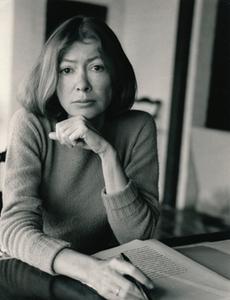 |
|
| Joan Didion (photo: Jerry Bauer) |
|
"Joan was very specific about the texts she wanted read," the Very Rev. Patrick Malloy said of the private service held in April for Joan Didion at the Cathedral of St. John the Divine in New York City. She died in December 2021, and her remains are interred in the Cathedral, along with those of her husband, John Gregory Dunne, and daughter, Quintana Roo Dunne Michael. Didion selected readings from the 1928 Book of Common Prayer, "with the Elizabethan language still intact," Malloy explained. "Rhythms and sounds of words are important; the pattern of words conveys things beyond our ken."
The specificity of language, memories, moments also wove their way through last night's public celebration of Didion's life, held at the Cathedral Wednesday night. Shelley Wanger, senior editor at Penguin Random House, recalled Didion's "penetrating gaze" and described her as "part sage, part prophet." New Yorker editor David Remnick described Didion as employing "her exacto knife that was her prose." Author and New Yorker staff writer Jia Tolentino spoke of Didion's "clairvoyant dissembling of overprecious myth," and author and New Yorker writer and theater critic Hilton Als said, "Joan taught me that family was always part of the story along with place, and how the writer's job was to face the terror, beauty, banality and truth inherent in being a citizen of both."
Griffin Dunne, Didion's nephew and the director of Joan Didion: The Center Will Not Hold (2017), recounted an embarrassing moment from his childhood, in which everyone laughed at him but Joan. He thought, "Here was a woman who'd never be swayed by public opinion."
Retired Supreme Court Justice Anthony M. Kennedy knew Didion through his sister Nancy; they were high school best friends. He recalled that even then Didion was teaching him by example to be "more free from hidden bias, more free from self-interest, and more free from mistaken assumptions that obscure facts." Jerry Brown, former governor of California, who also met Didion through his sister, read with admiration her description in the essay "Many Mansions" of the Sacramento house the Reagans were constructing (and which ceased construction in 1975) to live in while governing the state: "It is simply and rather astonishingly an enlarged version of a very common kind of California tract house... as devoid of privacy or personal eccentricity as the lobby area in a Ramada Inn." Author Calvin Trillin read from "Insider Baseball," in which Didion's words from 1988 eerily presage the present state of politics.
Poet Kevin Young said he was struck by how much poetry Didion included in The Year of Magical Thinking, and also by her description, "Grief has no distance." He read from his own poem "The Mission," which Young said he wrote while living across from a funeral home in San Francisco, shortly after he discovered Didion's writing. He closed with Yeats's "The Second Coming," from which Didion derived the title of her book Slouching Towards Bethlehem.
Patti Smith sang Bob Dylan's "Chimes of Freedom," accompanied by Tony Shanahan on guitar, and Alexi Kenney played violin.
Actress Susan Traylor, Quintana's best friend, brought the audience inside a celebration for Quintana's seventh birthday, for which Didion prepared individual chocolate soufflés for all the children. Traylor described John Dunne's chiding of Didion, almost as ritual, when Susan and Quintana gathered, and Didion's reply: "I didn't know how to make birthday cake; I knew how to make chocolate soufflés."
Writer Susanna Moore took us inside her friendship with Didion: "Her silence was a refuge I often preferred to conversation." This set the stage for pithy observations of Didion's that Moore has carried with her, one in response to an anecdote about Bianca Jagger: "Evil is the absence of seriousness," and another after Moore attempted to defend the erratic behavior of someone else: "Crazy is never interesting." When someone suggested to Moore they thought Didion had based her novel Democracy on Moore's family, Moore asked her about it. The next day, Didion suggested, "I would drop this whole idea of knowing the truth."
Vanessa Redgrave, who played Didion on Broadway in the theatrical presentation of The Year of Magical Thinking, said Didion was present at every performance, including the U.K. tour and the play's opening in London; she would eat dinner at a small café table offstage "in the wings." Redgrave repeated this phrase for emphasis, "in the wings," then paused as she looked up into the cavernous Cathedral of St. John the Divine, and said, "And there's that rose window." --Jennifer M. Brown

